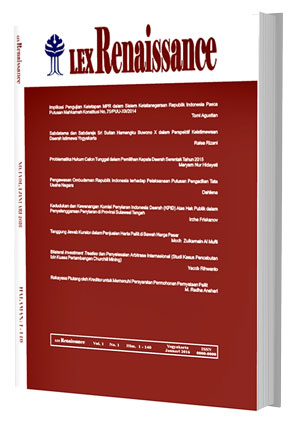Main Article Content
Abstract
Abstract
This study describes the legal force Establishment of Cooperative deed of Notary after the Constitutional
Court ruling No. 28 / PUU-XI / 2013, as well as analyzing the legal implications of the Minister of
Cooperatives and SMEs towards authority in making Cooperation Deed Notary. This research is a field
research by using juridical empirical approach. The study concluded, first: the power of cooperative law
deed of Notary after the Constitutional Court ruling No. 28 / PUU-X / 2013 resulted in a shift in the
regulations regarding cooperatives for the time that is returned to Act No. 25 of 1992 concerning
Cooperatives until enactment of the new law. Therefore, the whole procedure and the establishment of
cooperatives from the date of repeal of Act No. 17 of 2012 concerning Cooperatives by the Constitutional
Court back in Act No. 25 of 1992 concerning Cooperatives and all implementation regulations. Secondly,
the implications of Ministerial Decree No. 98 / KEP / M.KUKM / IX / 2004 regarding Notary Public as
Cooperation Deed, making Notary public official authority in this case to serve the public in the process
of making authentic evidence in accordance with the authority granted by UUJN- P, is limited, because
the authority of the notary is a deed authentic under the Act, unless another Specifies Act.
Keywords: Notary, NPAK, cooperatives, shift deeds, deed of cooperation
Article Details
Authors who publish with this journal agree to the following terms:
a. Authors retain copyright and grant the journal right of first publication with the work simultaneously licensed under a Creative Commons Attribution License that allows others to share the work with an acknowledgement of the work's authorship and initial publication in this journal.
b. Authors are able to enter into separate, additional contractual arrangements for the non-exclusive distribution of the journal's published version of the work (e.g., post it to an institutional repository or publish it in a book), with an acknowledgement of its initial publication in this journal.
c. Authors are permitted and encouraged to post their work online (e.g., in institutional repositories or on their website) prior to and during the submission process, as it can lead to productive exchanges, as well as earlier and greater citation of published work (See The Effect of Open Access).



